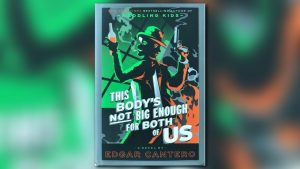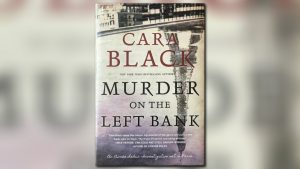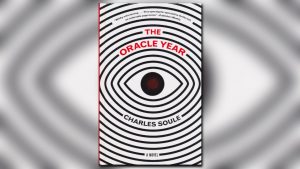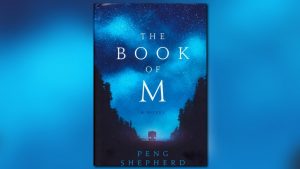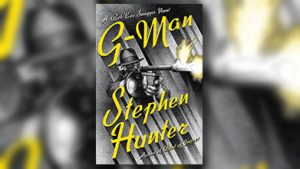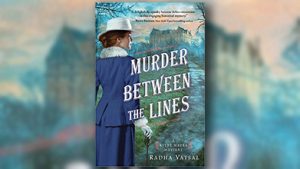As a sequel to the “Fool”, “The Serpent of Venice” revives the heroic Pocket of Dog Snogging, his sidekick, Drool, and Jeff, his pet monkey.
The novel takes place in Venice long ago.
Pocket is invited to join three distinguished Venetians for dinner, but the hosts are not particularly fond of him.
In fact, they have devised a desperate scheme to get rid of Pocket by luring him to a dark dungeon for a night of drinking and a visit from one of the host’s daughters, the beautiful Portia.
However, the wine is drugged and Portia nowhere near the city, but Pocket won’t be fooled.
VOICEOVER: And now, an Eight original production.
VOICEOVER: "Books & Co." is made possible by the Virginia G. Piper Center for Creative Writing, Serving writers and readers in the Phoenix metropolitan area, the state of Arizona, and the world.
ALBERTO RIOS: Welcome to "Books & Company." Bienvenidos todos. I'm your host, Alberto Rios and we're joined by New York Times bestselling author Christopher Moore who will be talking about his book, "The Serpent of Venice," which sounds a lot like the Merchant of Venice and maybe you'll get us started.
CHRISTOPHER MOORE: That was on purpose. This book is obviously set in Venice and I sort of loathe this term but it is a mash-up in a way of the Merchant of Venice, Othello, and Edgar Allan Poe's story The Cask of Amontillado.
ALBERTO RIOS: Before you go on, this just messes with English majors' minds right?
CHRISTOPHER MOORE: This validates them. This is someone who's a barista but has a degree in English, and they think I did not waste my time. It started with Venice; I was in Venice a couple of years ago. I had gone to a literary festival and I thought this is a perfect place for a monster story. I thought what other horror stories have been set in Venice? The Cask of Amontillado immediately come to mind, in which a nobleman walls up a fellow person who is dressed as a fool and I have a fool in my oeuvre. I wrote a book in 2008 called fool. And so then it was taking place in Venice. Those characters and that scenario and went from there and worked in history in the 13th century.
ALBERTO RIOS: You mix together three literally, the plots, the characters, the language, the sensibility of the times which you struggled with, you talked about that at the end of the book that you're working with a time period, you have to make them all work. In that process of mixing everything up, humor happens.
CHRISTOPHER MOORE: And that's the thing that you always have to add because outlines or synopsis are never funny. Most of the humor is carried by the character Pocket whose job is to make fun of all these dire mustache villains and hand wringing of maidens in distress and he's the central character of my story, but trying to reconcile the ethics of anti-Semitism, racism and in my story it takes place in 13th century, Shakespeare's play takes place in the 16th century. And I had to move them to make them fit my Pocket character.
ALBERTO RIOS: And I love that you did.
CHRISTOPHER MOORE: It made it more interesting. Venice in the 1200s was sort of the hale burton of their day. We would love to see another crusade because we have ships, you don't, we would love to take all of your infrastructure to the holy land and charge you a good amount for it. So they became the power of all Mediterranean because of the crusades and they were very happy to see another one. That was an interesting piece of history by moving it to the 13th century.
ALBERTO RIOS: And then ironically they were angry at the Jews, they had all of this anti-Semitism charging them with doing exactly that, That part made me laugh as well.
ALBERTO RIOS: The humor here, though, you break the… Let me just say you break the rules of narrative. I mean, that as a good thing. You break the rules of humor. There are no rules and Pocket is constantly doing whatever comes to mind. How do you work with a character like that?
CHRISTOPHER MOORE: He refers to himself…the character in King Lear, I think is called the all license fool, your are all license fool and that was the fools role to be the only one who could speak truth to power. So his entire existence is sort of been saying the thing that's out of place, speaking the truth at someone else's expense. That's actually just a lot of fun. That's a great device to but in any situation and he also happens to be unthoughtfully brave. You don't know if he's brash, he puts himself in a lot of danger very often, rescues people. But my rules --
ALBERTO RIOS: Even as he does that, he's insulting people left and right.
CHRISTOPHER MOORE: He holds no fear. Even as he's being walled up in the dungeon, he's like get on with it, you are not doing it right, the wall won't fit because you have thrown a brick at me. He's completely irreverent and he'll tell the joke at all costs. It's fun to write a character like that because we don't live in a world like that.
ALBERTO RIOS: And we should take special mention of how he does that, too. It's not simply language; it's obscenity after obscenity, raised to an art form.
CHRISTOPHER MOORE: The Brits know how to swear. I've heard French authors say this is the language for poetry and this is the language for engineering and English is the language for swearing because it's very direct and you don't have to refer to people's lineage and so forth. It's very direct and there's a lot of Anglo-Saxon words, you can put consonants where you want them and I have a lot of fun with the artistry of swearing. That all took off as I was reading British comedy and just really enjoying the way they were blase. Even BBC 1, their very public family television will have all sorts of words you can't say in the US context.
ALBERTO RIOS: You referred to it as the artistry of the swearing. When I started reading the book, I was a little resistant to it. I was thinking this is -- maybe it's like a one trick pony, you're making fun of Shakespeare, it grows on you and I have to say the artisan of the swearing, which I wouldn't have thought would have been a big draw and a literary device. You almost crave it at the end as a reader, this guy is so funny, he's so over the top with it that it becomes almost his language, it becomes almost a character.
CHRISTOPHER MOORE: It is and as a poet, you can appreciate the sort of -- it's not so much the literal meaning of the things that he's saying, it's the music of what he's saying and the swearing. Unfortunately, we can't say it here to give any examples but it's a lot of fun to make those things and up put them together and bring them along and his reaction is the more self-important you are, the more artfully he's going to take you down. And it's his special talent. He's a tiny guy physically, not intimidating in the least bit but he's very talented at deflating the overinflated ego.
ALBERTO RIOS: And not above claiming size regarding this piece.
CHRISTOPHER MOORE: He overcompensates with that.
ALBERTO RIOS: All of the things, I like, too, I don't think there's an instance where I felt there was a one liner. They progress. The insults, they grow. They mature. All sorts of things start to happen and they the insults themselves become thematic along with the regular plot.
CHRISTOPHER MOORE: And it's a lot of fun because he becomes a champion of those people who are the outsiders, to go down the rat hole of theme. The thing that Othello is about and the Merchant of Venice is about is the outsiders. Othello was an outsider to the Venetian society and Shylock is an outsider to society. And Pocket becomes their champion. It does not make him above of making fun of every aspect of Judaism and being in African that he possibly can through the entire thing.
ALBERTO RIOS: And that overtop nature, it allows you then it felt like to me to then feel free to go over the top in all sorts of other ways. Not just plot and bringing together a braiding of different stories but even working with things that are pretty basic to writers tool box, things like similes, just starting at the begin, there was one that just made me laugh and it wasn't Pocket. This was you the author who said they tittered through gritted teeth, and then Portia flung her needle point off the veranda as if it were a pie made from leprosy. That never ended and it got stranger and stranger and I loved it.
CHRISTOPHER MOORE: It's fun, those characters that are so delicate and well-spoken are the ones you have the most fun with. And I like to reverse the roles. Portia first line is oh, my little body is so weary. It's so sad being a princess. And the servant girl is very sympathetic. Well in my story, Nerissa is the one that gets the line. It's pointed out to her many times that she's a brat and that's maintained through the entire story, with all the different characters. When Shylock says if you prick us do we not bleed and Pocket pokes him with a dagger and says well, you asked. Well you asked. That’s Shylock’s speech.
ALBERTO RIOS: You do that throughout. That's one good instance, you do that throughout. Nothing is left alone.
CHRISTOPHER MOORE: Not if I can get it in there.
ALBERTO RIOS: You asked there’s always a follow-up. What I think is always interesting is you bring the reader into it, as well. On the stage of the stage is also directed at the reader. You do talk about Shakespeare having a narrator that wanders through the stage, but the players don't see and you do that for us on occasion where you suddenly are turning to the reader.
CHRISTOPHER MOORE: And addressing the audience. I always thought it was funny. The Chorus, which is a character in Shakespeare’s play Romeo and Juliet, he gets one of the best lines. One of my favorite lines from Shakespeare Henry's V, “Oh, for a muse of fire that would ascend the brightest heaven of invention. He opens Henry the 5th with that opening -- yet he wanders throughout the act, through battlefields, and no one notices him and here they turn and they're like who's the nutter speaking the bloody obvious? I had fun with the conventions of stage and what I always hope, thinking of the audience, is if you don't know what that is, you'll still have fun. I never wanted to be elitist and make people feel like it's not accessible because I always get asked should I read The Merchant of Venice beforehand or Othello other things first. You don't have to. If you want to or if you want to see a movie with it, sure. That would give you some context but better to read this and then see what Shakespeare did with my material.
ALBERTO RIOS: I would like to take a moment to remind our viewers that you're watching "Books & Co.," I'm your host Alberto Rios and we're joined by Christopher Moore talking about his most recent book, "The Serpent of Venice." One of the things as we were talking about, the way the narrator might wonder around, you the narrator wander around a little bit. You also take care of some pragmatic things, that are sometimes describe to Pocket, and sometime they're the narrator, sometimes, they float around. You say this is all taking place in Venice. But they're all speaking English. You take a lot of delight in pointing out.
CHRISTOPHER MOORE: Well, I think it's funny and it's something that we as 21st century people are accustomed to, all Romans speak with an English accent. And all these people in Roma, Venice Rome and Athens, they all speak with English accents. That's how we've always heard them and there's -- I think something that's delightful is that there's nothing Italian at all about Shakespeare's Italian characters. They don't have any of the sort of -- any of those things that we think of as being Italian. Passion or you know they don’t particularly like anchovies,
ALBERTO RIOS: Or even Italian food.
CHRISTOPHER MOORE: Exactly, So to sort of insert that. At one point, Pocket says if it weren't for Othello saving Venice, we would all be speaking Italian right now. Because they were in war against the Venetians. And someone said we are all speaking Italian.
ALBERTO RIOS: I like that, it's a play.
CHRISTOPHER MOORE: To write a funny novel, everything has to be on the board. You can't say I'm only going to work within this, then it's not going to be funny. You might get a blurb that someone says is hilarious and they read and say that's not hilarious and you have to put it all in there.
ALBERTO RIOS: One of the things I think you do very well is you write and you think with the writer. You're not just writing for pages. You're thinking with the reader. There's the one moment where Pocket says yes, after a little bit of discussion which is referring to the piece yes, I have small feet but no one finds you clever. And its directly pointing at the reader for thinking that, you've given us all the variables and it's very funny when things like that happen. We've been talking about all the over the top humor. But it is a humorous novel top to bottom. And over the top is one kind of humor. Probably the neon of humor in the book. But there's a lot of quiet, stolid, carefully circulated humor. You have some instances, I'm thinking, for example, when Nerissa is talking to Desdemona and she's talking, you point out she's quietly mismatching all the shoes.
CHRISTOPHER MOORE: Right, right.
ALBERTO RIOS: It's almost an aside, nothing's made of it, nothing comes of it necessarily. Just this quiet little mayhem, and there's humor here but there's also humor on the side.
CHRISTOPHER MOORE: When we meet Portia and she delivers that line oh, my little body is so weary because she is dealing with all these princes who are suitors. The description of the two characters and I think I can't quote it from memory but it basically says they had known each other all their lives and so loved and hated each other like sisters. There are little things that reinforce that as things go along and Desdemona is the sister of Portia because that worked out as I was putting these two places together this light went on. The same actor played these characters. And you go down through the cast of both books and you can see clearly Iago and Antonio were the same actor. Emilia and Nerissa were the same character and so in some cases I was able to consolidate those characters and other cases you know you sort of give each character their own personally.
ALBERTO RIOS: What I was intrigued by as well is that background humor, then how it played off against seriousness if indeed there was any in the novel and as it turns out there's plenty. I'm thinking of Iago in particular who delivers some funny lines mostly the story happens around him. Pocket is playing off of him often. And Iago has, for example a number of moments that don't get seconded nothing happens he basically says them. Where I their general, would I be one of them to do I want to be what I want to be. Well I love to be or not to be, the echo, would I want to be what I want to be.
CHRISTOPHER MOORE: He says Iago says I am not that I am and he spends most of the play Othello is Iago twisting his mustache to the audience and he has brilliant speeches and I think the hardest thing about writing this book is not to use the word sociopath because Iago is clearly under our definition a sociopath and maybe a psychopath. And to play with that and to play with the language, to say do I want to be what I want to be and those people who recognize I am not what I mean, and to be or not to be and those things that are over and over again. Those parallel constructions that Shakespeare uses which is sort of a wonky way of looking at it.
ALBERTO RIOS: It's a great way to look at it. One of the funniest things that plays through as well is we're hearing lines we're familiar but you're putting them all over the place. I think you said dear Portia, don't be silly, to thine own self be true. And I'm thinking wait she didn't say that. And me thinks the lady doth protest too much said Iago.
CHRISTOPHER MOORE: One of my favorite scenes. I won’t say exactly what she said, I think the lady protests just the right amount. I think the lady is just getting started. That's how you want Ophelia to reply to hamlet. A lot of it is they come from all the different plays.
ALBERTO RIOS: I practically fell of my chair. I thought that was wonderful. One other point, you have the higher level of language, things like that, that echo from Shakespeare but you have some of the playfulness things that Shakespeare does have that you do something more with. You have this great moment where something's going on a bed let's just say and you have the character saying he said that? No, my lord, but his bed is squeaky. Thus I spoke how it.
ALBERTO RIOS: It was funny on all sorts of level. The whole mix.
CHRISTOPHER MOORE: You get to have fun with the sound of it and that goes back to always thinking of the audience. Before I contemplated doing this, I was researching fool and I was lucky enough to go see Othello perform at the old globe in London and behind the stage looking at the audience, a great place for the writer to sit. I saw how they reacted when Desdemona came up and they lit up and when Iago came out and they scold to watch that whole play, great, great actors and how the audience from all over the world was reacting to the stage, I can't do this without being conscious of someone in my case reading the book, someone viewing all that's going on and that's where if it sounds funny, it will be funny.
ALBERTO RIOS: You have some other moments that are like that, as well that are just on their own terms beguiling. You're playing with language beyond the story, it's beyond the acts of Shakespeare. Who is that said the.... It is I, said I. It's just language at its foundational.
CHRISTOPHER MOORE: And the things -- the part of it, too, was to take that Elizabethan and Jacobean language that Shakespeare used and make it sound like Shakespearean so that modern Americans can read it and it's not too hard. Shakespeare is hard. You know. It's hard. The one part of the book, the invocation is written in iambic pentameter. It took me three days to write one page in iambic pentameter i though we won’t be doing this book in iambic pentameter as it turned out to be hard. But it's written by ear. So it sounds Shakespearean but it should be very easy for anybody that knows how to read.
ALBERTO RIOS: And that language become a musicality which Shakespeare attained by that iambic pentameter meter. You find it in different ways. It’s a different song but it’s a song anyway and I think that part is truly wonderful. Shakespeare you say at the very end, this is interesting was there's not a trend setter, there's a trend follower and maybe you can speak to what that means to you.
CHRISTOPHER MOORE: It makes me feel better about, you know easting his corpse. I think of the 36 plays, 33 are plots taken from somebody else. I think Tempest is original but the others are form Italian love stories or retelling of stuff like that. And there was a King Lear play, a play that played six years before he would have known about it. It played in London before he wrote King Lear. It was a similar plot and based on the ancient English history. So that's not why we remember Shakespeare. We remember Shakespeare for the language and anybody, who can work with language, will ask me why did Shakespeare write these goofy novels about vampires and I said it's because I work with words and this guy was the long John of the English language. You can't work with the English language and not go back to this guy and not say there will never be another genius like this in the language. and that why go and feed from his corpse.
ALBERTO RIOS: And it becomes fertilizer for something…
CHRISTOPHER MOORE: I've been called that before.
ALBERTO RIOS: To grow from that. I think you are following Shakespearean tradition of Shakespeare followed somebody and you're following something Shakespeare doing and not only that, we tend to think of books as being books. To take three books and to bring them… to start saying can’t we play well together can’t we do something together is another interesting idea, very 21st idea, I thing.
CHRISTOPHER MOORE: That's sort of the math of the equation. You just -- I think the two plays have 38 characters and you have a lot to manage. And so there's a lot of determine what you're going to be put in, this person's he and that person is there and I introduce characters like the 2 huge Jews, the minions, stuff like that. And a lot of it is just logistics and I map them out in big sketch pads before I get down to crafting scenes, which is sort of a different part of it. But it's -- I don't know if there's an analogue when you're a poet to do that, I feel you would design in the page. When you're doing something the size of a novel, if you want to get it done ever, you have to plan it out ahead and hopefully come out on the other side.
ALBERTO RIOS: Good advice. Thank you for talking about your book today so elegantly.
CHRISTOPHER MOORE: Thank you for having me.
ALBERTO RIOS: I would like to say to our viewers, you've been watching "Books & Co." You've been your host Alberto Rios, we've been joined today by Christopher Moore talking about his most recent book, "The Serpent of Venice." I keep wanting to say the Merchant of Venice.
CHRISTOPHER MOORE: That's how it's supposed to be.
ALBERTO RIOS: Please join us again next time. We'll be bringing you another good book.





